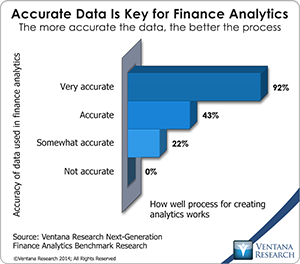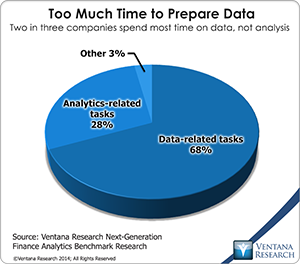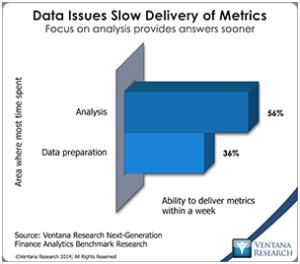Our research consistently finds that data issues are a root cause of many problems encountered by modern corporations. One of the main causes of bad data is a lack of data stewardship – too often, nobody is responsible for taking care of data. Fixing inaccurate data is tedious, but creating IT environments that build quality into data is far from glamorous, so these sorts of projects are rarely demanded and funded. The magnitude of the problem grows with the company: Big companies have more data and bigger issues with it than midsize ones. But companies of all sizes ignore this at their peril: Data quality, which includes accuracy, timeliness, relevance and consistency, has a profound impact on the quality of work done, especially in analytics where the value of even brilliantly conceived models is degraded when the data that drives that model is inaccurate, inconsistent or not timely. That’s a key finding of our finance analytics benchmark research.
 A main requirement for the data used in analytics is that it be accurate because accuracy affects how well finance analytic processes work. One piece of seemingly good news from the research is that a majority of companies have accurate data with which to work in their finance analytics processes. However, only 11 percent said theirs is very accurate, and there’s a big difference between accurate enough and very accurate. The degree of accuracy is important because it correlates with, among other things, the quality of finance analytics processes and the agility with which organizations can respond to and plan for change.
A main requirement for the data used in analytics is that it be accurate because accuracy affects how well finance analytic processes work. One piece of seemingly good news from the research is that a majority of companies have accurate data with which to work in their finance analytics processes. However, only 11 percent said theirs is very accurate, and there’s a big difference between accurate enough and very accurate. The degree of accuracy is important because it correlates with, among other things, the quality of finance analytics processes and the agility with which organizations can respond to and plan for change.
Although almost all (92%) of the companies that have very accurate data also have a process that works well or very well, that assessment drops to 43 percent of companies that said their data is just accurate. Even in small doses, bad data has an outsized impact on finance analytic processes. Inaccuracies, inconsistencies and not comparable data can seriously gum up the works as analysts search for the source of the issue and then try to resolve it. As issues grow, dissatisfaction with the process increases. Just 22 percent of those with somewhat accurate data and none of the companies with data that is not accurate said their company has a process that works well or very well.
To be truly useful for business, analytics provided to executives, managers and other decision-makers must be fresh. The faster a company can deliver the assessments and insight as to what just happened, the sooner company can respond to those changes. Almost all (85%) companies with very accurate data said they are able to respond immediately or soon enough to changes in business or market conditions, but only 35 percent of those with accurate data and just 24 percent of those with somewhat accurate data are able to do so.
Moreover, having data that is timely enables companies to react in a coordinated fashion as well as quickly. Companies that are able to operate in a coordinated fashion are usually more successful in business than those that are somewhat coordinated in the same way that a juggler who is somewhat coordinated drops a lot of balls. Almost all (86%) companies whose data is all up-to-date said they are able to react to change in a coordinated or very well coordinated fashion, compared to just 38 percent of those whose data is mostly up-to-date and 19 percent that have a significant percentage of stale data. Three-fourths (77%) of companies that have very accurate data are able to respond to changes in a coordinated or very well coordinated fashion, but just one-third (35%) of those with accurate data and 14 percent with somewhat accurate data are able to accomplish this.
Speed is essential in delivering metrics and performance indicators if they are to be useful for strategic decision-making, competitive positioning and assessing performance. Companies that can respond sooner to opportunities and threats are more able to adjust to changing business conditions. The research finds that fewer than half (43%) of companies are able to deliver important metrics and performance indicators within a week of a period’s end – that is, soon enough to respond to an emerging opportunity or threat.
One way to speed up the delivery of analytics is to have analysts  focus their time on the analytics. But the research shows that not many do: A majority of analysts spend the biggest chunk of their time dealing with data-related issues rather than on the analysis itself. Two-thirds (68%) of participants reported that they spend the most time dealing with the data used in their analytics – waiting for it, reviewing it for quality and consistency or preparing it for analysis. Only one-fourth (28%) said their efforts focus most on analysis and trying to determine root causes, which are the main reasons for doing the analysis in the first place. In other words, in a majority of companies, analysts don’t spend enough time doing what they are valued and paid for.
focus their time on the analytics. But the research shows that not many do: A majority of analysts spend the biggest chunk of their time dealing with data-related issues rather than on the analysis itself. Two-thirds (68%) of participants reported that they spend the most time dealing with the data used in their analytics – waiting for it, reviewing it for quality and consistency or preparing it for analysis. Only one-fourth (28%) said their efforts focus most on analysis and trying to determine root causes, which are the main reasons for doing the analysis in the first place. In other words, in a majority of companies, analysts don’t spend enough time doing what they are valued and paid for.
The results also show that there are negative knock-on effects of spending time on data-related tasks rather than on analysis. More than half (56%) of the companies that spend the biggest part of their time working on analytics can deliver metrics and indicators within a business week, compared to just one-third (36%) of those that spend the biggest part of the time grappling with data issues. Having high-quality, timely and accessible data therefore is essential to reaping the benefits of finance analytics.
 Data issues diminish productivity in every part of a business as people struggle to correct errors or find workarounds. Issues with data are a man-made phenomenon, yet companies seem to treat bad data as a force of nature like a tornado or an earthquake that’s beyond their control to fix. Our benchmark research on information management suggests that inertia in tackling data issues is more organizational than technical. Companies simply do not devote sufficient resources (staff and budget) to address this ongoing issue. One reason may be because the people who must confront the data issues in their day-to-day work fail to understand the connection between these and getting the results from analytics that they should.
Data issues diminish productivity in every part of a business as people struggle to correct errors or find workarounds. Issues with data are a man-made phenomenon, yet companies seem to treat bad data as a force of nature like a tornado or an earthquake that’s beyond their control to fix. Our benchmark research on information management suggests that inertia in tackling data issues is more organizational than technical. Companies simply do not devote sufficient resources (staff and budget) to address this ongoing issue. One reason may be because the people who must confront the data issues in their day-to-day work fail to understand the connection between these and getting the results from analytics that they should.
Excellent data quality is the result of building quality controls into data management processes. Our research finds a strong correlation between the degree of data quality efforts in finance analytics and the quality of the finance department’s analytic processes and output, and ultimately its timeliness and its value to the company. Corporations generally – and finance organizations in particular – must pay closer attention to the reliability of the data they use in their analytics. The investment in having better data will pay off in better analytics.
Regards,
Robert Kugel – SVP Research














